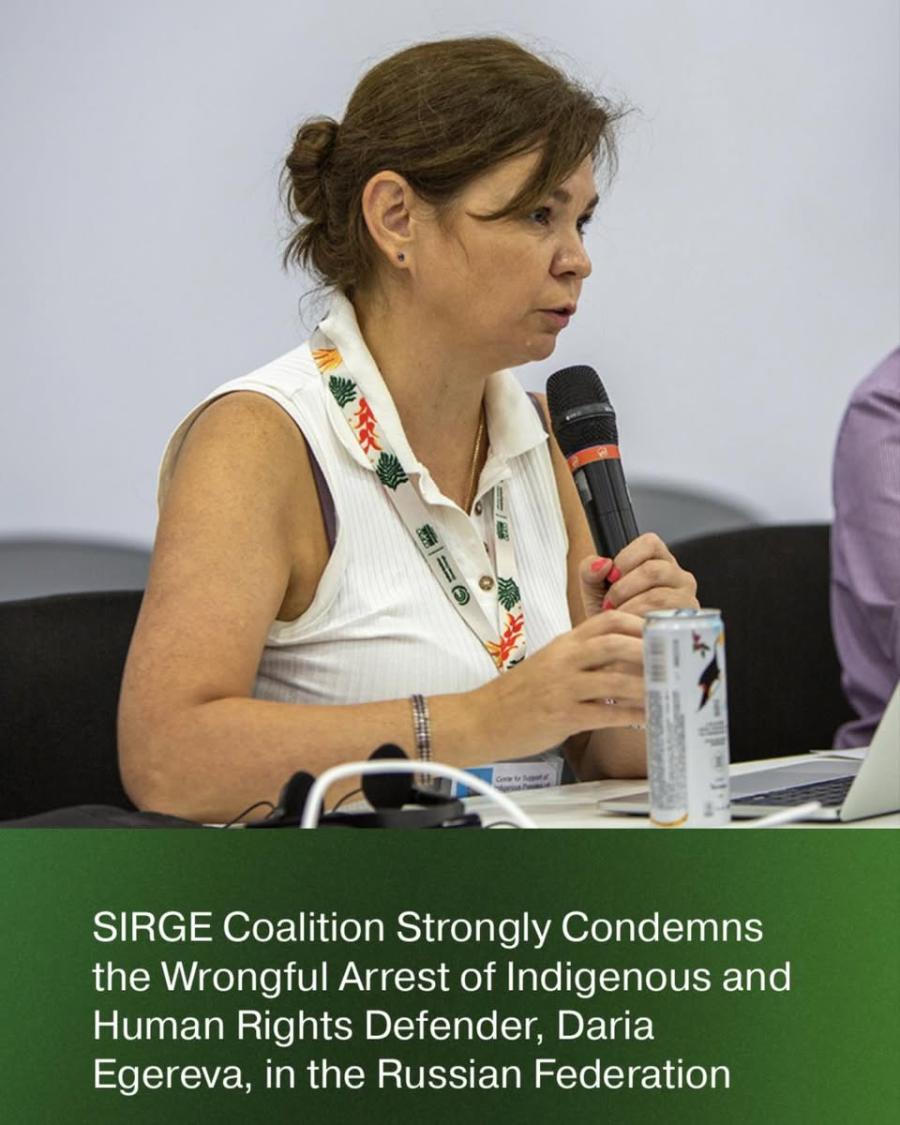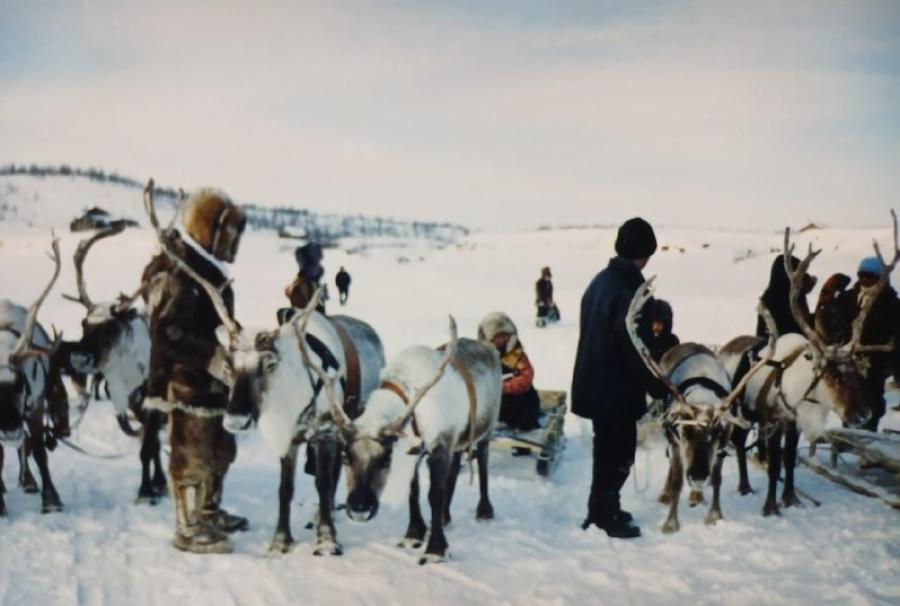
In April 2023, Cultural Survival submitted a joint stakeholder report with partner organizations IWGIA, Society for Threatened Peoples (STP), and International Committee of Indigenous Peoples of Russia (ICIPR) on the state of Indigenous Peoples’ rights in the Russian Federation for the 44th Universal Periodic Review. In the Universal Periodic Review process, fellow United Nations member States assess the human rights situation of the member state under review and make recommendations, taking into account information gathered in civil society reports as well as reports from the country itself.
Indigenous Peoples’ rights are often overlooked in the midst of other human rights issues in Universal Periodic Reviews, which is why Cultural Survival submits thematic reports focusing specifically on the state of Indigenous rights in the country under review. We partner with communities and other NGOs to bring together relevant Indigenous rights violations in order to uplift the struggles of Indigenous communities around the world.
Russia’s UPR session took place on November 13, 2023. Even though the review session was understandably very focused on the war in Ukraine, Indigenous Peoples' rights were taken into account by several States when making recommendations. Several recommendations that Cultural Survival and our partners had made were stated by representatives of member States to Russia.
The delegation from Mexico recommended that Russia “Ratify ILO Convention 169, and abolish the requirement of 50,000 people maximum for official recognition of Indigenous Peoples.” This current State-imposed definition means Peoples containing over 50,000 members, including Buryats, Altaians, and Yakuts, some of which have all other characteristics of Indigenous Peoples, are not legally recognized. This recommendation directly reflects two of our report’s recommendations.
The delegation from Colombia recommended that Russia “Implement the recommendation of the Human Rights Committee to ensure the participation of Indigenous Peoples in the decision-making process affecting their lands and resources based on the principle of Free, Prior and Informed Consent, guarantee the freedom of association of Indigenous Peoples and protect indigenous human rights defenders.” This recommendation also directly reflected one of our recommendations.
Moreover, numerous States made recommendations on the dangers of the foreign agent law and its complementary legislations, which intensify control over civil society by identifying any person or group considered to be “under foreign influence” as a threat. The Russian government uses this law as a pretext to implement intimidation tactics like the threat of criminal prosecution to dissuade Indigenous rights activists and many of them are now listed as foreign agents and have experienced smear campaigns or pressure from the police or the FSB (Federal Security Service). Cultural Survival and our partners, along with several other reporting organizations, made recommendations on this topic.
Throughout our report, we highlighted several other issues affecting the fulfillment of Indigenous Peoples’ rights in Russia, such as the controversial lists of places of traditional residence and types of traditional economic activities of Indigenous Peoples. These lists define Indigenous people by the occupations they have and where they live, which exclude Indigenous persons who do not meet the limited and inadequate criteria. For example, the list of places mostly includes rural settlements which exclude Indigenous people living nomadically or in urban settings and the list of traditional economic activities does not include those related to the preservation of Indigenous languages, cultures and Traditional Knowledge. Further limiting Indigenous Peoples’ rights, these lists are both taken into account by the Registry of Indigenous Peoples which came into force in 2022 and requires specific information and documents which are extremely difficult for Indigenous people to produce. Domestic protections, including the right to use their land freely for hunting and fishing or to compensation in case of damages to ancestral lands, are only extended to registered Indigenous people, violating the rights to self-determination and to use their lands for traditional activities.
Indigenous Peoples’ right to education is also violated in the Russian Federation. Many Indigenous settlements do not have schools and many in remote areas have been shut down. Indigenous parents are forced to send their children to boarding schools, sometimes hundreds of kilometers from home. This traumatizes children and threatens their cultural identities.
Moreover, in recent years there has been a decrease in the number of schools where native languages are taught and the time allotted to Indigenous languages has been reduced. These conditions are devastating for the survival and transmission of these languages as schools play a fundamental formal role in intergenerational transmission of knowledge and information.
As a result of administrative barriers to hunting and fishing, the nutritional balance available to Indigenous Peoples has worsened dramatically in a short period of time, with damaging effects on Indigenous people’s health. In addition, the regions where Indigenous Peoples live often do not have enough health centers, obstetrician-aid stations, general practitioners, and outpatient clinics to serve all inhabitants.
Another acute problem is the impact of climate change on Indigenous Peoples, their territories, resources, and their future. Changes in traditional landscapes due to warming climate have negative consequences. Natural disasters including floods, droughts, forest fires, waterlogging of settlements, and others are becoming more frequent, and Russia's efforts to combat climate change are minimal.
Together with our partners, we urged UN member States to make recommendations to the Russian Federation regarding these important issues which prevent Indigenous Peoples in Russia from fully enjoying their rights. Indigenous Peoples’ own self-determined practices of registration need to be respected and access to high quality healthcare services and education in their own languages ensured.
Following the UPR session, Russia will have the opportunity to accept or note (reject) the recommendations that were made. For those accepted, civil society organizations and Indigenous Peoples will closely monitor whether the Russian Federation fully implements them or not.
Read the stakeholder report.
Photo by Ninara.
Lovozero, Russia. Cultural Center, Kola Peninsula, Russia. Sami and Komi Peoples.



